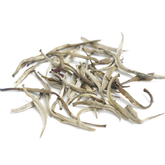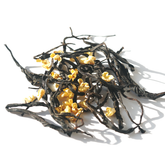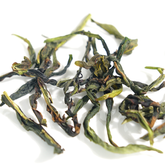Do Tea Bags Expire? A Complete Guide to Tea Bag Shelf Life
Tea bags are known for their convenience compared to loose-leaf tea. While loose tea often requires a gaiwan and involves a more complex brewing process, tea bags can be brewed with just a simple glass, making them popular worldwide. Many people choose tea bags for their everyday tea-drinking routine. Although tea bags don’t spoil like fresh food, many still wonder, "Do tea bags expire?" ,This article explores the shelf life of tea bags and how to maintain their best flavor.

The Shelf Life of Tea Bags
Most tea bags are made from the six main types of tea, although some may contain added flavors or colors. The shelf life of a tea bag depends on its main ingredients, which type of tea is used, and how it's stored. While tea bags don't spoil in the traditional sense, they do have a shelf life. Proper storage ensures the best flavor when consumed within this time frame. Here's a breakdown of the shelf life for different types of tea bags:
- Green Tea: Best consumed within one year. It's recommended to store green tea bags in a sealed container in the refrigerator.
- White Tea: White tea gets better with age. Store it in a cool, dry, and dark place in an airtight container.
- Oolong Tea: Best consumed within 1-2 years. Lightly fermented oolong teas, such as Tieguanyin, should be stored in the refrigerator and consumed sooner. Roasted Oolong teas, like Da Hong Pao, don't need refrigeration.
- Black Tea: Best consumed within 1-2 years. Fresh black tea has a stronger aroma, but over time, the fragrance may diminish.
- Dark Tea (Raw Pu-erh): Both raw and ripe Pu-erh tea improve with age when stored properly in a cool, dark, and airtight environment.

Although tea bags don’t spoil like milk or fruit, their flavor and aroma will fade over time. Lighter fermented teas, such as green or white tea, have shorter shelf lives and their flavor deteriorates more noticeably after expiration. To enjoy the best flavor, it's recommended to consume tea bags within their shelf life.
How to Store Tea Bags Properly
- Dry Area.Store your tea bags in a dry environment. Moisture makes tea bags grow mold, which greatly affects the quality and may even make it unsafe to drink. For example, do not use a wet spoon or wet hands when reaching for the tea bags, as this may lead to spoilage(mildew). If the tea bags have an unusual smell or discoloration, they have gone bad and should be thrown away.
- Avoid oxidation.The tea bags need to be sealed tight, so as not to allow too much air inside. The reason for this is that whenever oxygen comes into contact with the leaves of the tea, the active compounds inside the tea itself start to break down and will result in a loss of flavor. Because of this, the opening of the tea bag often should be avoided and excess air taken out to keep freshness. Similar requirements exist for loose-leaf teas, since quality degrades with time due to oxidation.
- Avoid Odors.Tea leaves are prone to odors in the environment. Keep them away from smelling areas to retain the natural smell. For instance, tea should not be stored next to coffee or any other strong-smelling products. In addition, each type of tea should be kept in a different container to prevent cross-contamination of flavors that may alter the unique scent of each tea type.
- Avoid Sunlight.Tea should be kept in a spot that is away from the direct sun. Sunlight hastens the oxidation process and this often causes the active compounds in the tea to spoil quickly. As such, it is not advisable to store tea in transparent containers, like glass jars, which expose the tea to light. The trick behind maintaining the quality and flavor of tea is storing it in a cool and dark spot.
- Avoid High Temperatures.Tea bags should be stored in a cool environment. Too much heat accelerates the oxidation process that will make the tea lose its fragrance and flavor. Thus, always keep your tea bags away from sources of heat, such as near stoves or under direct sunlight, to not lose the full taste and aroma of the tea.
What Happens When Tea Bags Expire?
When tea bags pass their expiration date, the most noticeable changes are in the tea's taste and aroma. Freshly produced tea bags have a strong, rich scent, while expired tea bags may taste flat or stale. Over time, the active compounds in tea, such as antioxidants and polyphenols, break down, reducing the health benefits. Although expired tea bags won’t harm your health, their taste might not be as pleasant as before. It’s always best to consume both tea bags and loose leaf tea within their shelf life to enjoy optimal flavor.
How to Prolong the Shelf Life of Tea Bags
Proper storage is key to extending the shelf life of tea bags. Keep tea bags in a dry, cool place away from sunlight and air exposure. Airtight containers are ideal to prevent moisture from affecting the quality of the tea. Tea leaves that are exposed to air will oxidize faster, causing the tea to lose its flavor. With proper storage, tea bags can maintain their quality for an extended period.

Can I Drink Expired Tea Bags?
While expired tea bags aren’t necessarily "bad," you should discard them if they smell off or if the brewed tea has an unusual color or taste. Tea bags exposed to moisture might develop mold, which is a sign they should be thrown away immediately to avoid health risks.
Conclusion
Tea bags do have a shelf life, but even when they expire, they aren’t necessarily undrinkable. However, their flavor will be noticeably diminished. For the best taste and experience, it’s always recommended to consume tea bags within their expiration date and store them properly. This way, you can enjoy the rich aroma and health benefits tea has to offer.
While exploring the fascinating world of tea bag shelf - life, it’s interesting to note that just as tea bags have their own usage timelines, the right furniture can enhance your tea - drinking experience. If you’re looking for a stylish and durable surface to place your tea cups on, Orangme offers a stunning solid wood coffee table, which adds a touch of natural elegance to your tea - sipping corner but also provide a sturdy base for your tea - brewing paraphernalia. Whether you’re enjoying a cup of freshly brewed tea alone or having a tea party with friends, a solid wood coffee table from Orangme can be the perfect companion.
Frequently Asked Questions About Tea Bags and Shelf Life
1. Do tea bags expire?
Yes, most tea bags are made from one of the six main types of tea—green, black, oolong, etc.—which do have a shelf life. For the best flavor, it's recommended to consume them within their expiration date.
2. Can you reuse tea bags?
Yes, tea bags can typically be reused once or twice, but if the flavor is gone, it's time to replace the tea bag.
3. How much tea is in a tea bag?
Most tea bags contain 2-3 grams of tea, which is the ideal amount for brewing a cup without the tea becoming too bitter or too weak. You can check the packaging for more specific details.
4.How to choose high-quality tea bags?
NPTEA recommends selecting whole leaf tea bags, as natural tea leaves are healthier. Opt for tea bags with intact tea leaves rather than low-quality tea dust bags, as tea dust tends to be more bitter and can lead to excessive caffeine intake(Choose NPTEA's flower tea bags).
SEE MORE CHINESE TEAS
If you have questions about selecting tea:
Learn-more-about-chinese-tea
If you have questions about the benefits of tea:
Health-benefits-of-chinese-tea
If you have questions about brewing tea:
How-to-brew-loose-leaf-tea






